



Professor, MD, Chief Physician of the Department of Neurosurgery and Spine Surgery, Helios Klinikum Krefeld
Specialization:
Author of more than 120 scientific papers and articles, and 200 reports.
Michael Rauschmann is Head of the Department of Spine Orthopedics and Reconstructive Orthopedics at the Sana Clinic in Offenbach. Prior to that, he headed the Department of Spinal Orthopedics at the Orthopedic University Hospital Friedrichsheim for 11 years.
FOCUS magazine has ranked him among the TOP doctors in spine and orthopedics in Germany every year since 2012.
In addition to his medical activities, Professor Michael Rauschmann is actively involved in scientific activities. In 2015, he became President of the German Spine Society (DWG). At the DWG, Prof. Rauschmann is responsible, among other things, for certifying centers to achieve mandatory quality standards. He is also involved in the creation of the National Spine Registry.
He is also involved in numerous scientific projects and publishes regularly in specialized journals.
Main specialization:
Training and professional experience:
Scientific activity:
Participation in professional societies:
Professor Kredel graduated from the Hannover Medical School in 1983. He then trained in orthopedic surgery in Hannover and Munich.
He is currently Chairman of the Orthopedic Department of the Alfred Krupp Krankenhaus Clinic in Essen, Germany.
His clinical and research interests include the treatment of spondylitis, degenerative diseases of the spine and arthroplasty.
Membership:














Check the cost of treatment and get 20 000 € from international foundation
Get financial help up to 20 000 € for your child treatment
Medical consultant
Turkish oncologist will provide an individual chemotherapy program.
Israeli oncologist will provide an individual chemotherapy program.
Spanish oncologist will provide an individual chemotherapy program.
German oncologist will prepare an individual chemotherapy program.
Polish oncologist will prepare an individual chemotherapy program.
Italian oncologist will prepare an individual chemotherapy program.
Turkish radiologist will prepare a personalized radiation therapy program
Israeli radiologist will draw up an individual radiation therapy program.
German radiologist will draw up an individual radiation therapy program.
Spanish radiologist will draw up an individual radiation therapy program.
Polish radiologist will prepare an individual radiation therapy program.
Italian radiologist will draw up an individual radiation therapy program.
Turkish plastic surgeon will make an individual operation program.
German plastic surgeon will make an individual operation program.
Israeli plastic surgeon will make an individual operation program.
Italian plastic surgeon will make an individual operation program.
Polish plastic surgeon will make an individual operation program.
Spanish plastic surgeon will make an individual operation program.
Turkish orthopedic surgeon will make an individual operation program.
Israeli orthopedic surgeon will make an individual operation program.
German orthopedic surgeon will make an individual operation program.
Italian orthopedic surgeon will make an individual operation program.
Lithuanian orthopedic surgeon will make an individual operation program.
Polish orthopedic surgeon will make an individual operation program.
Ukrainian orthopedic surgeon will make an individual operation program.
Spanish orthopedic surgeon will make an individual operation program.
Turkish neurosurgeon will study the medical situation and give recommendations for treatment.
Israeli neurosurgeon will study the medical situation and give recommendations for treatment.
German neurosurgeon will study the medical situation and give recommendations for treatment.
Italian neurosurgeon will study the medical situation and give recommendations for treatment.
Lithuanian neurosurgeon will study the medical situation and give recommendations for treatment.
Spanish neurosurgeon will study the medical situation and give recommendations for treatment.
Ukrainian neurosurgeon will study the medical situation and give recommendations for treatment.
Turksih doctor will answer your questions
Israeli doctor will answer your questions
German doctor will answer your questions
Italian doctor will answer your questions
Polish doctor will answer your questions
Ukrainian doctor will answer your questions
Spanish doctor will answer your questions
Israeli orthopedic surgeon prepare an individual surgical plan and recomendations
Turkish orthopedic surgeon prepare an individual surgical plan and recomendations
German orthopedic surgeon prepare an individual surgical plan and recomendations
Italian orthopedic surgeon prepare an individual surgical plan and recomendations
Lithuanian orthopedic surgeon prepare an individual surgical plan and recomendations
Polish orthopedic surgeon prepare an individual surgical plan and recomendations
Spanish orthopedic surgeon prepare an individual surgical plan and recomendations
Lithuanian doctor will answer your questions
After examining your situation, doctor will make an individual price offer.
Doctor-consultant will answer all your questions about the cost of treatment, the choice of a doctor and fully organize treatment abroad.

we will contact you within 15 minutes
Spine treatment in Germany is a current request among foreign patients. The spine is the basis of the human musculoskeletal system, which is susceptible to various diseases and injuries. They can lead to a decrease in quality of life, limitation of movement, chronic pain, and disability. According to WHO, over 80% of people have spinal problems of varying severity. Therefore, it is important to seek qualified medical help promptly.
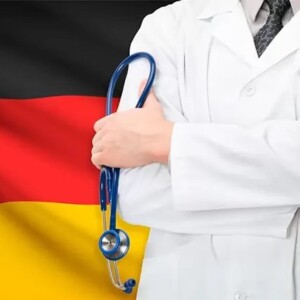
Spine treatment in Germany means a high level of diagnostics, conservative and surgical treatment, rehabilitation and prevention. The most effective and safe therapy methods are used here, allowing you to restore spinal function, eliminate pain, and prevent complications.
German clinics are recognized as one of the best for treating diseases of the musculoskeletal system. The main advantages include:
Dorsal operations – through posterior access to the spinal column;
Ventrodorsal operations are done through anterior and posterior approaches to the spine.
According to consolidated data from German clinics, over 80% of patients who underwent back treatment in Germany were able to get rid of severe spinal diseases completely.

Back diseases are recognized as the No. 1 disease in developed countries. The main reasons for the development of pathologies include:
Many pathologies develop due to age-related changes in bones and blood supply to tissues. Heredity plays a significant role: if there are genetic disorders in the family history, there is a high probability of predisposition to the development of pathologies.
Doctors at the Schon Clinic in Munich recommend contacting a specialist if you have the following symptoms:
German clinics successfully treat all pathologies: neurodegenerative diseases, tumors and spinal injuries, protrusion and herniated intervertebral discs.
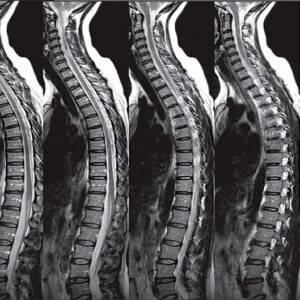
Back examinations in German clinics are highly accurate, informative, and meet international standards. German specialists use advanced video diagnostic techniques. This allows:
At the University Hospital Essen, doctors prescribe:
Patients also undergo laboratory tests: general blood test, biochemical blood test, and general urinalysis.
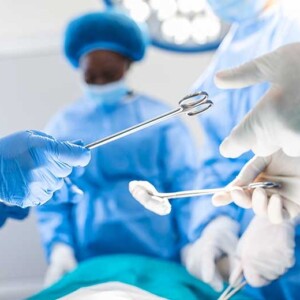
Spinal surgery is one of the priority areas of medicine in Germany. German surgeons prefer minimally invasive operations that allow:
Hospitals in Germany are equipped with high-tech operating equipment, thanks to which surgeons can operate using micro-invasive techniques. In Germany, unique technologies for treating spinal diseases are widely used, but they are not always available in the patient’s homeland. For example, surgeons at the Asklepios Clinic in Hamburg use:
The main advantages of spine surgery in Germany are the high level of technology in operations and the many years of practical experience of neurosurgeons.
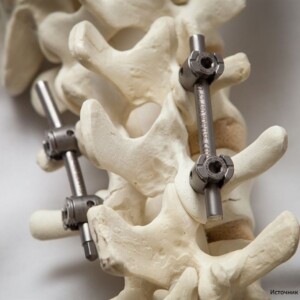
In German hospitals, a wide arsenal of advanced minimally invasive techniques is used for spinal surgeries:
According to hospital aggregate data, the success rate of spine surgery in Germany exceeds 98%.
If there is no need for emergency surgical intervention associated with the threat of motor disorders (for example, paralysis), German doctors can offer conservative treatment methods.
For the treatment of the spine in Germany, many developments of metabolic therapy are available using effective medications, which have no analogs in other countries. In 85% of cases, doctors manage to achieve good results without surgery.

At the Alfred Krupp Clinic in Essen, patients are prescribed:
In German clinics, intradiscal electrothermal therapy (IET) is widely used for degenerative changes in intervertebral discs. This minimally invasive treatment method is based on introducing a catheter with a heating element into the affected disc under X-ray control.
The cost of back treatment in German hospitals includes many factors:
Estimated prices for spine treatment in Germany:
To find out more about the prices for spine treatment in Germany, just call the consultant doctors of Experts Medical.
They will provide complete information on this topic and suggest the most advantageous offers, taking into account the nature of the disease.
German hospitals are recognized as one of the world’s leading hospitals for treating any spinal pathology. Doctors manage to completely rid the patient of a complex disease, even in cases where treatment was ineffective in his homeland. Experts Medical coordinators monitored hospitals, studied patient reviews, and based on this, they identified the most successful clinics in Germany for spine treatment:
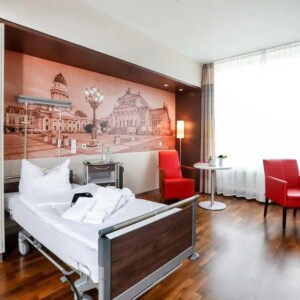 Helios Clinic Berlin-Buch. The best spinal microsurgery specialists practice here. The hospital has its own donor bone bank and one of the best rehabilitation centers in the country. Conservative treatment of degenerative pathologies of the spine is carried out using injections around the damaged area under CT guidance.
Helios Clinic Berlin-Buch. The best spinal microsurgery specialists practice here. The hospital has its own donor bone bank and one of the best rehabilitation centers in the country. Conservative treatment of degenerative pathologies of the spine is carried out using injections around the damaged area under CT guidance.On the Experts Medical website, you can read patient reviews about spine treatment in Germany. More information will be provided by the company’s coordinating doctors.
In order not to waste time and quickly get medical help from the best German specialists, it is better to immediately call the coordinating doctors of Experts Medical. As soon as possible they will help:
The Experts Medical team will be in touch 24/7 with the patient at all stages of spine treatment in Germany, so it will take place in a comfortable and safe environment.